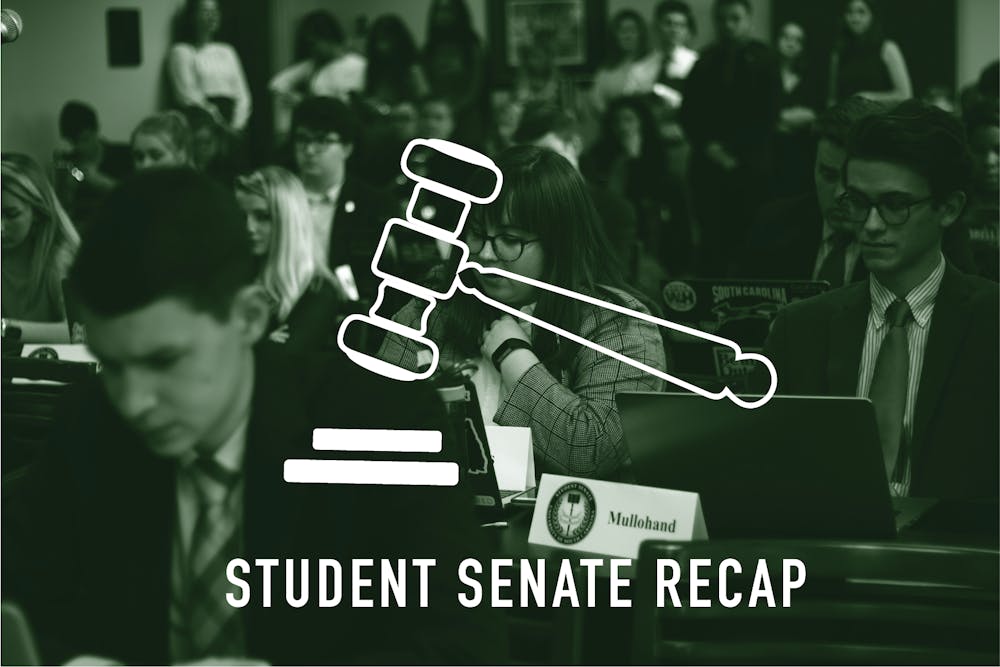USC's student senate swore in new executive staff members and passed two new pieces of legislation at its weekly meeting on Wednesday.
Several executive staff positions were filled, including but not limited to deputy chief of staff, chief of staff, press secretary, director of programming, director of outreach, chief advisor and internal outreach coordinator. Other positions included director of policy and legislative affairs, director of internal affairs, director of special events and co-directors of philanthropy.
The office of the student body president requested special approval to create the co-directors of philanthropy positions, which would exceed the number of allocated staff positions for the 2024-2025 term. Student Body President Patton Byars said there have never been co-philanthropy directors on the executive staff before.
"It is crucial for Student Government leaders that we actually serve our community. I think we can all agree on that," Byars said. "These groups of leaders, I have the utmost confidence in. And if you'd like to join them in serving our community, you can join the philanthropy team."
After a voice vote, the staff positions were created and the newly appointed members took their oaths of office.
Speaker of the student senate Maura Hamilton said it is important for executives to have reliable staff members on their team to ensure that all of their responsibilities are distributed evenly.
"There are a lot of responsibilities that the executive members hold, but that they are given the discretion to kind of hand off to other staff members," Hamilton said. "We really take our time interviewing and selecting the best people that we possibly can to make sure that they're going to do the job and they're going to do it right."
During the motion period, senator Tyler Morgan motioned to move a bill, SBL11602, to the first reading calendar, where bills are introduced for the first time. The bill concerned efforts to change the current structure for money spent on campaigns. It was previously deemed unanimously unfavorable by the rules committee and was not added to the public information folder.
Senator Camden Kaye, who voted for the bill to be moved to the first reading calendar, said he supported Morgan's reasoning that political spending is a form of free speech.
"Right now, for campaigns, there is typically a cap or a limit," Kaye said. "(Morgan's) intent, as he understood it, political spending is a part of free speech, and he wanted an unlimited cap back to it."
Senator Caleb Lapsley, who opposed the bill's advancement, said it seemed to focus more on personal issues than on the actual content of the bill.
"If the legislation is in the benefit of the students, then yeah, no problem, but if it seems more personal. I think rules committee makes very solid judgements," Lapsley said. "In order to maintain the integrity of our senate, some things just don't need to be addressed."
The motion failed 24 to three and was not added to the first reading calendar.
Two pieces of legislation were also passed during the senate session.
SBL11580, introduced by Kaye, is a bill that aims to set standards for how executives should be present during their training sessions.
The bill amends the codes to ensure that, when elected as a Student Government executive officer, individuals must attend university training over spring break to receive stipends funded by the student activity fee. After their first spring semester, officers must work at least 15 hours a week during the summer as Student Life Ambassadors. Their presence doesn't need to be physical, but it must be dutiful, according to the bill.
"What the bill effectively does is ensures that executive members, whether in their physical form, or at least in spirit, intend to fulfill their obligations over summer hours," Kaye said.
The legislation passed unanimously.
The other piece of legislation, SBL11601, was a bill to allocate funds for Student Government during the 2024-25 fiscal year.
Senator William Wenzel, who introduced the bill, said it concerns internal allocations within Student Government.
"(The bill) helps the internal budget. It's good to allocate monies to certain areas and to make sure that everyone has a plan and not go over that," Wenzel said.
These funds allocate $61,093 among the Student Government operational fund, Student Government transition fund, Freshman Council fund and Elections Commission fund.
The legislation passed unanimously.
The student senate will hold its next meeting on April 10 in the Russell House Theater at 5:30 p.m. The meeting is open to all students wishing to attend.

